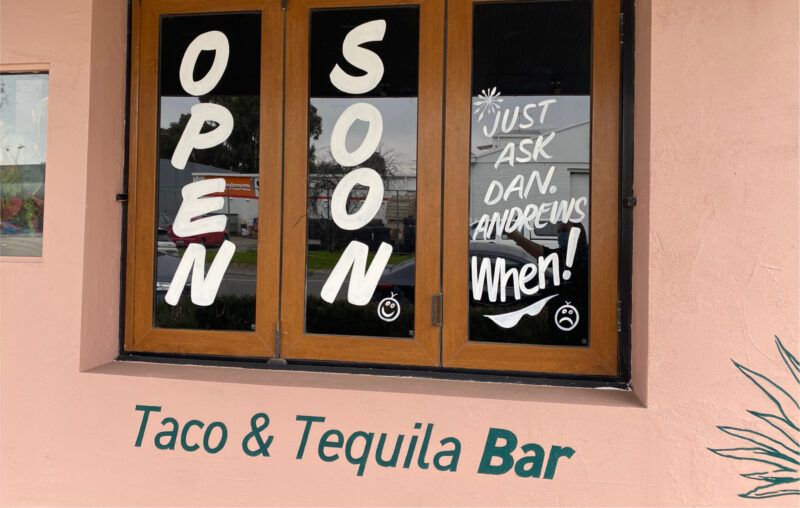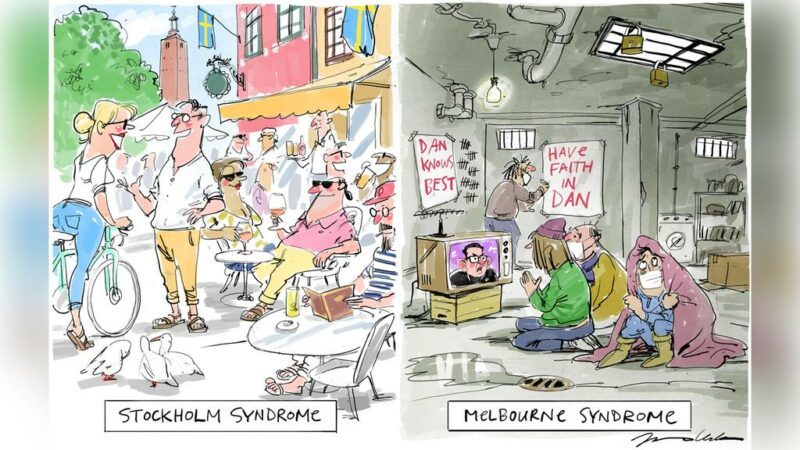The Melbourne Syndrome

The Covid pandemic has brought on our modern version of The Stockholm Syndrome which you will recall is: “Feelings of trust or affection felt in many cases of kidnapping or hostage-taking by a victim towards a captor.”
We now have the Melbourne Syndrome, which I come across versions of every day:
Feelings of trust or affection felt during a lockdown by its victims towards their most authoritarian political leaders.

Now why should it be the “Melbourne” syndrome? There are plenty of places similar where you find such attitudes. It should be called the “Melbourne” Syndrome because Melbourne has now implemented the hardest and longest lockdown at the hands of one of the most far-left and incompetent political leaders in the world, a leader who nevertheless retains high approval ratings, within a state in which the coronavirus issue went from benign to statistically explosive (although the death rate is still near invisible at something like 0.002% per head of population).
I therefore believe Melbourne should have the “honour” of bearing the name of this widely observed form of political insanity. Others are welcome to suggest alternative places and names.
And not only do we have the hardest lockdown possibly anywhere in the world, we also have the most incompetent leadership since unlike virtually everywhere else. Following the initial peak, things in Melbourne managed to get far worse whereas the norm everywhere else, including the rest of Australia, was for conditions to have improved. And let me provide a reminder of what we are being asked to endure.
These were “the Stage 4 Lockdowns” that were put in place by the Victorian Government at the start of August when out of nowhere there was a large statistical increase in the number of cases although trivially small relative to the size of the population. Melbourne by the way is the capital city of the state of Victoria.
- The “state of emergency” in Victoria has been upgraded to a “state of disaster,” meaning police can now enter your home to carry out spot checks even if you don’t give them permission and they don’t have a warrant.
- Between the hours of 8 p.m. and 5 a.m., you’re not allowed to leave your homes except for work, medical care and caregiving.
- Outside those hours, you may only leave your home for four reasons: shopping for food and essential items, care and caregiving, daily exercise and work. “We can no longer have people simply out and about for no good reason whatsoever,” said the Premier.
- Daily exercise can only take place within a 5km radius of your home and cannot last longer than an hour.
- You cannot exercise in groups of more than two, even if they’re members of the same household.
- Apart from daily exercise, you are only allowed to leave your home once a day for essential supplies and food.
- In the whole of Victoria, you cannot buy more than two of certain essential items, including dairy, meat, vegetables, fish and toilet paper.
- Schools have closed again, with all Victoria school students returning to remote learning from Wednesday (except for vulnerable children and children of permitted workers). Childcare and kindergarten will be closed from Thursday.
- Golf and tennis venues, which were open, have now been closed.
- Weddings will no longer be allowed from Thursday, and funerals will be limited to 10 people.
- Face masks anywhere outside your home have been mandatory for people in metropolitan Melbourne since July 22nd, but that rule has now been extended to the entire state of Victoria.
- You cannot have visitors or go to another person’s house unless it is for the purpose of giving or receiving care. However, you can leave your house to visit a person if you are in an “intimate personal relationship” with them, even during curfew hours.
- If you have a holiday home or were planning a holiday outside Melbourne, you must nevertheless remain in the city for the next six weeks.
- The maximum fine for breaching a health order currently stands at $1,652.
They have all been extended to September 28, with strict timeline in place concerning the basic right to have people over to your own house. That happens in late November. All this is due to the “modelling,” according to Dan Andrews.
Are people upset by these restrictions? The figures below are for Australia as a whole. Will get to Victoria in a moment.

As for the nature of the statistical collections, this is the Chief Medical Officer of Victoria specifically stating that to be classified as a Covid death only requires that the virus was present, not that it had been the actual cause of the fatality.
With this kind of approach, you could turn any common sickness into a statistical killer. Think of this as well, which is the first of the comments on the video.
I am a provider. One of my patients admitted herself into hospice d/t kidney failure and tested negative for “COVID.” When she died, they put on the death certificate death d/t “COVID.” We are in the early stages of a democide. This is what it feels like to have the governments force you to live in and breathe nonsense. War is peace, Freedom is Slavery, Ignorance is Strength and 2+2=5.
And are the numbers in Victoria exaggerated. Here are some stats for Victoria versus the rest of Australia that were published the other day. Victoria has around a quarter of the country’s population.
New Cases Australia – 25,205
New Cases Victoria – 18,608
New Cases Outside Victoria – 6,597
Recent Deaths Australia – 156
Recent Deaths Victoria – 14
Recent Deaths Outside Victoria – 7
Total Deaths Australia – 549
Total Deaths Victoria – 462
Total Deaths Outside Victoria – 87
So this is where we are:
[The Premier] said restrictions would be in place until next year if Victorians didn’t adhere to them and case numbers didn’t decrease.
“It won’t be a 6-week strategy, it will be much longer,” he said.
“We will be into 2021 with significant lockdowns in place.”
And do people resent this fantastic intrusion on their lives? Do they feel the heel of the state and wish to see it lifted? Here are the results of a poll of Victorians over whether they support the measures that have been taken:
The lockdown might be draconian, but Victorians overwhelmingly support the public health restrictions imposed to curb the second wave of coronavirus infections…. New research shows 72% of the sample backs the decision of the Victorian government to impose a curfew between 8pm and 5am, 71% supports curbs on leaving the house, while 70% endorse restrictions on business and the requirement that people travel no further than 5km from their house.
It’s the Melbourne Syndrome all right, unless someone can come up with an example even more absurd yet with the kind of wide support as we find in Melbourne, which used to be and was for many years the World’s Most Liveable City. Well we do still have very nice parks and restaurants, if only we were allowed to visit them, or our children, or our friends, or sit in a cafe, or go to the movies, or just to walk along the street or the beach more than a couple of miles from our home.
Really, is there anywhere else to compare with this? It is one of many such emails that have been sent to me from friends and family around the world who have found Melbourne mentioned in the local news. Melbourne does however stand well out from the pack.
You can therefore still see traces here in Australia’s origins as a penal colony.










